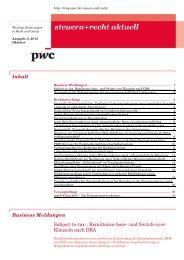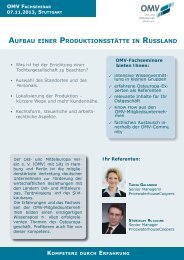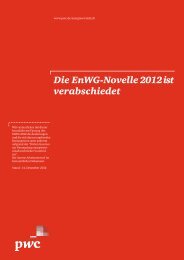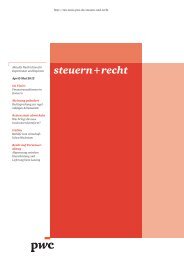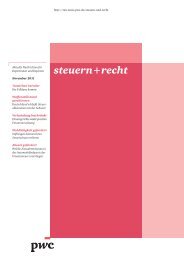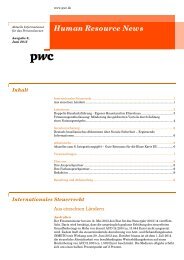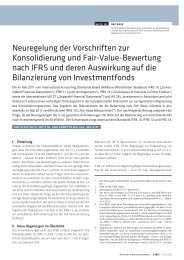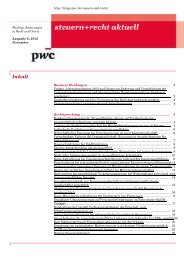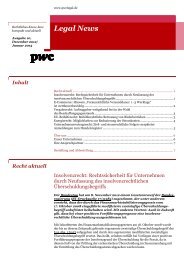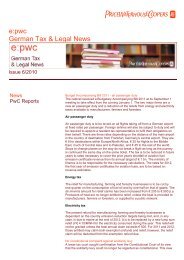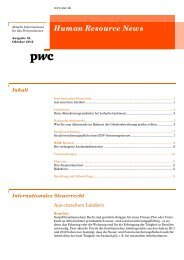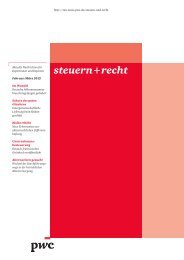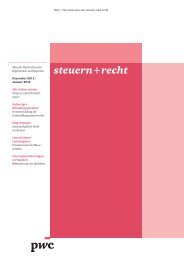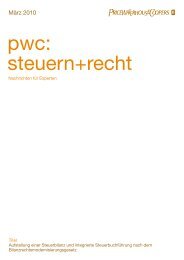Download legal-news-issue-7-2011 - PwC Blogs
Download legal-news-issue-7-2011 - PwC Blogs
Download legal-news-issue-7-2011 - PwC Blogs
You also want an ePaper? Increase the reach of your titles
YUMPU automatically turns print PDFs into web optimized ePapers that Google loves.
Tax & Legal News October 13, <strong>2011</strong> 3<br />
VAT-free samples<br />
On September 30, 2010, the ECJ held that the definition of a VAT-free sample should be<br />
based on its purpose, rather than on its nature (case C-581/08 EMI). Thus, an item given<br />
as a sample does not necessarily have to be distinct from corresponding items on display<br />
in retail outlets for sale to consumers. The finance ministry has just amended the relevant<br />
passages in its VAT Implementation Decree to follow the new definition. A sample is now<br />
a test item given for the sole purpose of enabling the recipient to assess the nature and<br />
quality of a product. It can be identical to a commercially available product where<br />
necessary for customer assessment, provided it is given in the interests of sales<br />
promotion. The object of a sample is to encourage the recipient (or others) to buy, not to<br />
save them from making a purchase.<br />
Intra-community supply exemption lost if customer concealed<br />
On December 7, 2010, the ECJ held that a German dealer in luxury cars sold to<br />
Portuguese dealers could not claim VAT exemption on the intra-community supply,<br />
because he had invoiced the deliveries to fictitious recipients. He was, in the<br />
circumstances, able to demonstrate delivery to Portugal, but, so the ECJ, had connived at<br />
the Portuguese VAT fraud of his customers by deliberately concealing their identity. This<br />
entitled the German tax office to levy VAT as though the sales had been made directly to<br />
private individuals. Later, the Supreme Tax Court relied on this case in taking the same<br />
stance in another case involving the sale of mobile phones by a German dealer to Austrian<br />
and Italian customers in the same beneficial ownership as his German supplier. The<br />
beneficial owner of the customers and the supplier had, in the meantime, been jailed for<br />
VAT fraud. If the German intermediary was an innocent party acting with all due care, his<br />
right to exemption on his intra-community supplies could not be denied. If he was not, he<br />
would lose the exemption, despite apparent adherence to the spirit of the regulations.<br />
The finance ministry has followed up on these two cases with a decree to the effect that<br />
intra-community supplies will not be exempt where the documentation and recording<br />
obligations have been breached and where the supplier has attempted to conceal the<br />
identity of the customer, thus allowing this person to conceal the acquisition in his own<br />
country. In such cases, it will no longer be open to the supplier to demonstrate actual<br />
intra-community delivery by other means.<br />
The case references are ECJ C-285/09 R judgment of December 7, 2010 and Supreme Tax<br />
Court V R 30/10 judgment of February 17, <strong>2011</strong>.<br />
Retail financing compensation payments within the motor trade subject to<br />
VAT<br />
It is customary in the motor trade to offer retail customers instalment payment terms at a<br />
very low rate of interest, or sometimes even interest-free. The customer buys the car from<br />
the dealer and the finance is provided by a captive bank belonging to the manufacturer.<br />
The interest subsidy (the difference between the agreed charge in the instalment<br />
payments and the current market rate) is split between manufacturer and dealer in a<br />
manner set out in the dealer's franchise but of no concern to the customer. Manufacturer<br />
and dealer pay their respective shares to the bank. The finance ministry has declared that<br />
the payments are to be regarded henceforth as being for market support services, and are<br />
therefore to be subject to standard rate VAT. As it stands, the decree is to have immediate<br />
effect. However, no objection will be taken to continued treatment of the interest<br />
subsidies as VAT-free payments by third parties for financial services up to December 31,<br />
<strong>2011</strong>, provided all parties involved take the same approach.<br />
Currency exchange is service for VAT<br />
In May 2010, the Supreme Tax Court held that a foreign currency exchange booth<br />
performed a banking service, rather than a delivery of goods, for VAT and that, in<br />
consequence, its VAT exemption was not dependent on adherence to export recording<br />
and documentation formalities. The finance ministry has accepted this judgment as a<br />
precedent in a recent decree, emphasising that it applies to exchanges of <strong>legal</strong> tender<br />
other than that dealt in for its metal value or for collectors. Sales of coins for their metal,<br />
or of notes and coins as collectors' items, continue to be regarded as sales of goods. The<br />
decree adds that the banking service of currency exchange does not restrict the input tax<br />
deduction for exchanges made in the ordinary course of other business. Hotels, shops,<br />
places of entertainment and other businesses accepting payment in foreign currency are<br />
the addressees of this latter point.<br />
The decree states that no objection will be taken to accounting for currency exchanges as<br />
sales of goods up to September 30, <strong>2011</strong>. However, the tax exemption for sales of <strong>legal</strong>



